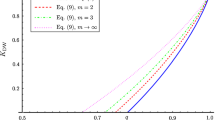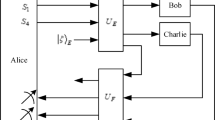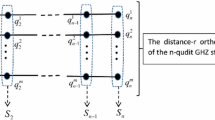Abstract
Quantum secret sharing allows each player to have classical information for secret sharing in quantum mechanical ways. In this work, we construct a class of quantum states on which players can quantumly perform secret-sharing secure against dishonest players as well as eavesdropper. We here call them the genuine secret-sharing states. In addition, we show that if N players share an N-party genuine secret-sharing state, then arbitrary M players out of the total players can share an M-party genuine secret-sharing state by means of local operations and classical communication on the state, where \(N > M \ge 2\). We also define the distillable rate with respect to the genuine secret-sharing state and explain the connection between the distillable rate and the relative entropy of entanglement.
Similar content being viewed by others
References
Blakley, G.R.: Safeguarding cryptographic keys. Proc. Natl. Comput. Conf. 48, 313 (1979)
Shamir, A.: How to share s secret. Commun. ACM 22, 612 (1979)
Hillery, M., Bužek, V., Berthiaume, A.: Quantum secret sharing. Phys. Rev. A 59, 1829 (1999)
Greenberger, D.M., Horne, M.A., Zeilinger, A.: Going Beyond Bell’s Theorem, Bell’s Theorem, Quantum Theory, and Conceptions of the Universe. In: Kafatos, M. (eds) p. 69. Kluwer, Dordrecht (1989)
Ekert, A.K.: Quantum cryptography based on Bell’s theorem. Phys. Rev. Lett. 67, 661 (1991)
Horodecki, K., Horodecki, M., Horodecki, P., Oppenheim, J.: Secure key from bound entanglement. Phys. Rev. Lett. 94, 160502 (2005)
Horodecki, K., Horodecki, M., Horodecki, P., Oppenheim, J.: General paradigm for distilling classical key from quantum states. IEEE Trans. Inf. Theory 55, 1898 (2009)
Chi, D.P., Choi, J.W., Kim, J.S., Kim, T., Lee, S.: Quantum states for perfectly secure secret sharing. Phys. Rev. A 78, 012351 (2008)
Vedral, V., Plenio, M.B., Rippin, M.A., Knight, P.L.: Quantifying entanglement. Phys. Rev. Lett. 78, 2275 (1997)
Vedral, V., Plenio, M.B.: Entanglement measures and purification procedures. Phys. Rev. A 57, 1619 (1998)
Hughston, L.P., Jozsa, R., Wootters, W.K.: A complete classification of quantum ensembles having a given density matrix. Phys. Lett. A 183, 14 (1993)
Holevo, A.S.: Bounds for the quantity of information transmitted by a quantum communication channel. Probl. Peredachi Inf. 9, 3 (1973)
Devetak, I., Winter, A.: Distillation of secret key and entanglement from quantum states. Proc. R. Soc. A 461, 207 (2005)
Kogias, I., Xiang, Y., He, Q., Adesso, G.: Unconditional security of entanglement-based continuous-variable quantum secret sharing. Phys. Rev. A 95, 012315 (2017)
Werner, R.F.: Quantum states with Einstein–Podolsky–Rosen correlations admitting a hidden-variable model. Phys. Rev. A 40, 4277 (1989)
Vidal, G., Werner, R.F.: Computable measure of entanglement. Phys. Rev. A 65, 032314 (2002)
Cleve, R., Gottesman, D., Lo, H.K.: How to share a quantum secret. Phys. Rev. Lett. 83, 648 (1999)
Bennett, C.H., Brassard, G., Crépeau, C., Jozsa, R., Peres, A., Wootters, W.K.: Teleporting an unknown quantum state via dual classical and Einstein–Podolsky–Rosen channels. Phys. Rev. Lett. 70, 1895 (1993)
Lee, S., Joo, J., Kim, J.: Teleportation capability, distillability, and nonlocality on three-qubit states. Phys. Rev. A 76, 012311 (2007)
Choi, M., Lee, S.: in preparation
Acknowledgements
This research was supported by the Basic Science Research Program through the National Research Foundation of Korea funded by the Ministry of Science and ICT (Grant No. NRF-2019R1A2C1006337) and the Ministry of Science and ICT, Korea, under the Information Technology Research Center support program (Grant No. IITP-2020-2018-0-01402) supervised by the Institute for Information and Communications Technology Promotion. S.L. acknowledges support from Research Leave Program of Kyung Hee University in 2018.
Author information
Authors and Affiliations
Corresponding author
Additional information
Publisher's Note
Springer Nature remains neutral with regard to jurisdictional claims in published maps and institutional affiliations.
Rights and permissions
About this article
Cite this article
Choi, M., Lee, S. Genuine secret-sharing states. Quantum Inf Process 20, 47 (2021). https://doi.org/10.1007/s11128-021-02988-3
Received:
Accepted:
Published:
DOI: https://doi.org/10.1007/s11128-021-02988-3




